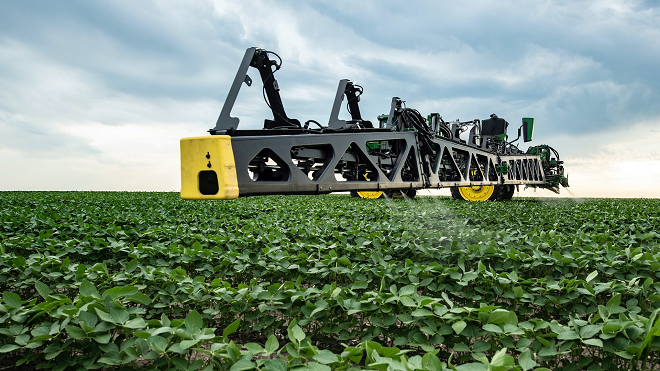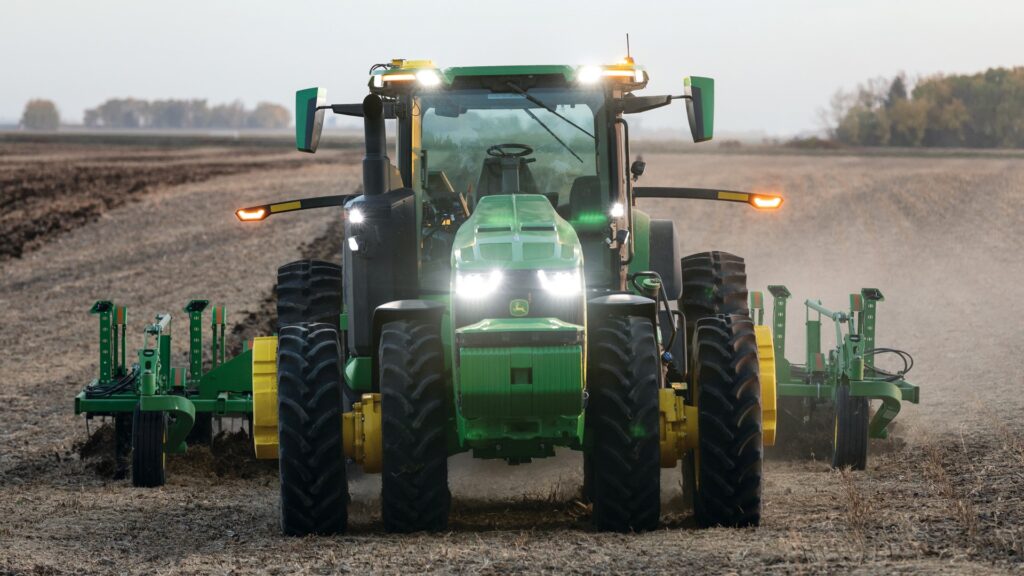
May 25, 2023Precision Ag: It’s all about meeting the needs of each plant
Precision agriculture tools are moving crop management away from treating all plants or trees in a field or orchard the same, said Chris Myers, a former John Deere executive and an advisor to a venture capitalist firm specializing in ag tech.
“The whole idea is that one of the most important changes is coming to our industry is this movement of crop production management from the field/block to the tree/plant level,” Myers said during a session on precision agriculture at the Southeast Regional Fruit & Vegetable Conference in January in Savannah, Georgia. “It’s going to happen, and it’s going to be great for growers and marketers and packhouses. This is a sea change in how we approach our business in order to be more efficient and more profitable.”
Myers spent most of his life in agriculture. His childhood was spent on a 120-acre apple and peach farm and he worked for almost 30 years at John Deere.
In 2021, he retired from John Deere as vice president of advanced technology and engineering and is an ag tech advisor with Trailhead Capital.
Startup Collaborator program
He discussed John Deere’s Startup Collaborator program, established in 2019. Although the company does not primarily serve specialty crop production, its precision agriculture tools can be used to boost efficiency in specialty crops.
When developing new products, John Deere’s tech concentration includes autonomy, connectivity and automation, Myers said. Technology capabilities, however, have grown dramatically, Myers said, with remote sensors, artificial intelligence and machine learning.
A major drawback to electric farm vehicles, he said, is the lack of new battery technology to improve electrification of more vehicles with longer charges. John Deere acquired a majority stake in Austria-based Kreisel Electric in early 2021, and announced in September 2022 it was investing in two more Kreisel locations to expand the company’s production capacity.
The tractor company plans to invest in battery assembly in the U.S. Electrification storage is preventing electrification moving into higher horsepower vehicles, Myers said.
“Storage is not economical, it’s not lightweight; there’s a lot of disadvantages,” he said.
John Deere is targeting 2026 as the year it will offer electric or hybrid options on all smaller tractors and other vehicles.
Embracing technology
“Sense and act” automation allows growers to increase efficiency in many ways. These include sensors alerting growers about numerous events, from warning about potential damage-causing hailstorms and other weather events, to pest, weed and/ or insect pressure in specific parts of fields or orchards, Myers said.
“This is where the growth has occurred in terms of technology,” Myers said. “It’s the sensors, it’s the computer vision, it’s the integration of all of that and the artificial intelligence and machine learning that brings it all together and brings a recommendation for action.”
John Deere acquired Blue River Technology for $305 million in 2011, taking advantage of its “See and Spray” technology. The robotics platform uses computer vision to recognize plants and weeds, spraying herbicides only when it detects weeds, and spraying fertilizer on select plants.
In 2017, John Deere acquired Bear Flag Robotics for $250 million. The autonomous tractor company acquisition helps John Deere in its goals to fully autonomize tractors.
Last year, the farm equipment company led the Series A funding round for InnerPlant, which netted $16 million in investments. The company is turning plants themselves into sensors, using their natural distress signals to trigger a fluorescence that can be seen with field equipment or satellite imagery.

The system will eventually allow growers to see when plants are in danger via pests, disease, lack of water or other threats.
Myers discussed other technology, including low-cost, dime-sized biodegradable sensors by IoT4Ag, an NSF Engineering Research Center project developing IoT technologies for precision agriculture. The University of Pennsylvania, Purdue University, University of California-Merced and University of Florida are collaborators in the venture.
The sensors broadcast low-range signals that can be picked up by tractors when they pass near the sensor. The sensor transmits information such as soil moisture and other readings to the driver.
“It’s a great way to find out exactly what’s going on in the field,” he said. “Clearly, we know what the goals are: to reduce inputs, increase outputs and quality, monitor water, nutrients, etc. It’s more precise, it’s lower-cost, it’s in real time,” Myers said about sensor technology and precision agriculture. “Clearly, there’s advantages with ground-level sensors.”
Myers said Ruben Technologies of Australia is developing a tool to assess when a fruit crop is ready for harvest. The product measures sugars, dry matter, acidity, internal colors, firmness and ripeness to determine when the harvest will most likely happen. It’s also a non-contact process, meaning that scanning allows the fruit to be evaluated without being cut or otherwise ruined through the evaluation process.
— Chris Koger, managing editor
Top photo: The “See & Spray” technology from Blue River Technologies
applies herbicides or other inputs on specific targets. Photo courtesy John Deere.
















